This
is only the "To Print" page. To go to the regular page of Ray Carney's
www.Cassavetes.com
on which this text appears, click
here, or close this window if you accessed the "To Print" page
from the regular page. Once you have brought up the regular page, you may use
the menus to reach all of the other pages on the site.
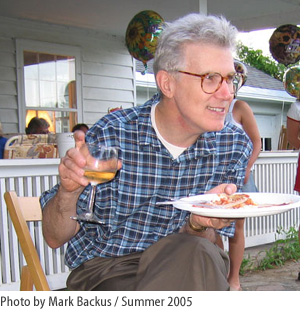 A note from Ray Carney: This spring (2007) represents the tenth anniversary of one of the most important events in the history of civilization. Like most other supremely important events, its occurrence was not reported in any of the mass media (just as the upcoming anniversary will not be reported). It's hard to say precisely, but I would estimate that only three or four thousand people, at the very most, have any idea what I am talking about, and it may be decades before what took place in the spring of 1997 is more generally known,or its full implications understood -- perhaps never. But I felt I owed it to myself and a few knowledgeable acquaintances to commemorate the moment. Like any world-historical event, the ramifications are really in the hands of succeeding generations. Nothing is determined; nothing settled at this point. All is potential, possibility, opportunity. Only time will tell if the event I am alluding to (and this deliberately veiled and oblique mention of it) represents a birth announcement or an obituary notice. --R.C.
A note from Ray Carney: This spring (2007) represents the tenth anniversary of one of the most important events in the history of civilization. Like most other supremely important events, its occurrence was not reported in any of the mass media (just as the upcoming anniversary will not be reported). It's hard to say precisely, but I would estimate that only three or four thousand people, at the very most, have any idea what I am talking about, and it may be decades before what took place in the spring of 1997 is more generally known,or its full implications understood -- perhaps never. But I felt I owed it to myself and a few knowledgeable acquaintances to commemorate the moment. Like any world-historical event, the ramifications are really in the hands of succeeding generations. Nothing is determined; nothing settled at this point. All is potential, possibility, opportunity. Only time will tell if the event I am alluding to (and this deliberately veiled and oblique mention of it) represents a birth announcement or an obituary notice. --R.C.
Prof. Carney,
I found this great website with interviews from many of these directors, as well as film clips. Euroscreenwriters.
Interviews:
Theo Angelopoulos
Ingmar Bergman
Robert Bresson
Carl Dreyer
Rainier Werner Fassbinder
Federico Fellini
Mike Leigh
Ken Loach
Jean Renoir
Andrei Tarkovsky
Lars Von Trier
Luchino Visconti
Film Clips:
Theo Angelopoulos
Ingmar Bergman
Robert Bresson
Rainier Werner Fassbinder
Federico Fellini
Andrei Tarkovsky
Also has quotes on directing, screenwriting and writing in general, as well as quotes on creativity and inspiration.
And a 5-minute film school (one quote per lesson):
Character and dramatization
Three-act structure
Finding inspiration
Film history
Writing and adaptation
Directing actors
Visual style
Ultimate goal
You'll love the website description:
"There are few cheaper ways of getting a quick and dirty injection of inspiration.
And it's cheaper than LSD or crack."
Keep up the great work on your site, Prof. Carney! It is wonderful.
M.
RC replies: Thanks for the stirring words. Keep working for change. And I don't mean for pennies. --R.C.
Dear Ray,
I recall your recent posting re: your distaste for interviews. Good response, by the way! Of course, they are not and never should be a replacement for actually viewing a director's films. I recall you've also said that the directors don't always do what they say, it's better rely on the films themselves. I find the interviews interesting just to see the concepts that the directors have in mind, what they think they are trying to portray and what is important to them. Probably my philosophical bent. Interviews can be useful, the thoughtful ones, at least. Every now and then, they may yield one precious pearl, food for my soul.
"In all my films, it seemed important to me to remind the audience to the fact that they are not alone, lost in an empty universe, but that they are connected by innumerable threads with their past and present, that through certain mystical ways, every human being realizes the rapport with the world and the life of humanity." - Andrei Tarkovsky
The artists become my friends and my teachers through their works and their words, if I am open and aware. And as I receive their gifts, I am forever changed. That must be the electron spin of building consciousness that grows my soul. And I mark those inner moments along my path.
Sincerely,
Georgia M.
RC replies: No need to apologize for citing an interview quote. I use interviews in my courses all the time. I'm not opposed to them in the least (though of course the work of art is the artist's supreme way of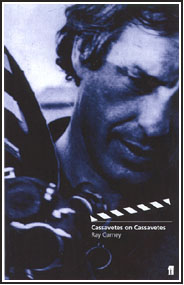 telling us what he or she thinks). The only time I find interviews annoying or pointless are when reporters (or journalism students) want to do one with me "to find out my ideas" about something I've already written an essay or a book about, but they are too lazy (or slipshod in their preparation) to bother with. The interview becomes their way of avoiding having to read anything -- or think about it more deeply and carefully. It's just like how the internet becomes the same sort of escape from a deeper engagement with a subject for a lot of people. As if Googling something or reading the Wikipedia entry could take the place of reading a book about it, really thinking and wrestling with it. Surfing is one of the big problems with our culture. We need more deep diving! (Read Eudora Welty's "The Wide Net" on that subject.)
telling us what he or she thinks). The only time I find interviews annoying or pointless are when reporters (or journalism students) want to do one with me "to find out my ideas" about something I've already written an essay or a book about, but they are too lazy (or slipshod in their preparation) to bother with. The interview becomes their way of avoiding having to read anything -- or think about it more deeply and carefully. It's just like how the internet becomes the same sort of escape from a deeper engagement with a subject for a lot of people. As if Googling something or reading the Wikipedia entry could take the place of reading a book about it, really thinking and wrestling with it. Surfing is one of the big problems with our culture. We need more deep diving! (Read Eudora Welty's "The Wide Net" on that subject.)
Great quote by the way. Tarkovsky is right. We are all connected to each other and to history and futurity, all the time, in ways we need to be reminded of. It's too easy to forget. To focus in too tightly. That's what American politicians and businessmen, above all, do in their quest for popularity and profit, and their focus on the short term and the bottom line. They screen out the big picture, the connections that exist even if they deny them. It's one of the main reasons individuals do so much damage--to others and to future generations not yet born--even as they never realize they are doing it.
When we cut ourselves, or our view of life, off from the "innumerable threads of rapport" Tarkovsky talks about--and evokes in his work--when we fail to see the big picture, everything we do will be wrong, limited, false, a lie. Even our one little life, as we think of it as OUR life and only OUR life, is a lie. OUR life is not OURS. We only hold it in trust to others. It is only a tiny part of what life really is. We touch others, in all directions and at all points. So even our egos represent a limited view of what we really are. The Buddhists understand this. Indra's net is how they put it. The one bright pearl is the true view of life. Everything else is blindness, illusion, mistake, destruction, sadness, America. --R.C.
A note from Ray Carney: After posting the above response, I received the following letter from Lucas Sabean that relates to it. He cites D.H. Lawrence as offering a similar observation about the limitations of an "ego-centered" view of our lives and relationships with others, the distortions of thinking (what Lawrence calls the working of "the mind"), and the fallacies of our false,  mistaken connections to the desire-created and thought-created illusions of achievement, attainment, success, money, power, and popularity. Question: What would an art that understood such things look like? Answer: Like the work of Alice Munro, of Henry James, of John Cassavetes, of Jean Renoir, of Andrei Tarkovsky, of Abbas Kiarostami, of Robert Bresson -- and the work of a lot of other great artists. Question: What would it not in the least look like? Answer: Like business-as-usual, like the news, like the newspaper, like television -- and certainly not like Hollywood or the work of Hitchcock, or Tarantino, or the Coen brothers. As Lawrence says, start with the sun, the stars, the cosmos; start with the earth and the rain and the clouds and the light and the air; start with your family, your friends, and others you love -- and the rest will slowly happen. --R.C.
mistaken connections to the desire-created and thought-created illusions of achievement, attainment, success, money, power, and popularity. Question: What would an art that understood such things look like? Answer: Like the work of Alice Munro, of Henry James, of John Cassavetes, of Jean Renoir, of Andrei Tarkovsky, of Abbas Kiarostami, of Robert Bresson -- and the work of a lot of other great artists. Question: What would it not in the least look like? Answer: Like business-as-usual, like the news, like the newspaper, like television -- and certainly not like Hollywood or the work of Hitchcock, or Tarantino, or the Coen brothers. As Lawrence says, start with the sun, the stars, the cosmos; start with the earth and the rain and the clouds and the light and the air; start with your family, your friends, and others you love -- and the rest will slowly happen. --R.C.
Ray,
This is an add on to the paragraph from your mailbag page 60 -- about losing our connections. I know that D.H. Lawrence wrote poems after his last work "Apocalypse". But I think the last few pages of "Apocalypse" are somehow his final words to us, like Cassavetes waving goodbye at the end of "Love Streams". Here are the last few paragraphs that I keep coming back to.
 "What man most passionately wants is his living wholeness and his living unison, not his own isolate salvation of his "soul." Man wants his physical fulfillment first and foremost, since now, once and once only, he is in the flesh and potent. For man, the vast marvel is to be alive. For man, as for flower and beast and bird, the supreme triumph is to be most vividly, most perfectly alive. Whatever the unborn and the dead may know, they cannot know the beauty, the marvel of being alive in the flesh. The dead may look after the afterwards. But the magnificent here and now of life in the flesh is ours, and ours alone, and ours only for a time. We ought to dance with rapture that we should be alive in the flesh, and part of the living, incarnate cosmos. I am part of the sun as my eye is part of me. That I am part of the earth my feet know perfectly, and my blood is part of the sea. My soul knows that I am part of the human race, my soul is an organic part of the great human soul, as my spirit is part of my nation. In my own very self, I am part of my family. There is nothing of me that is alone and absolute except my mind, and we shall find that the mind has no existence by itself, it is only the glitter of the sun on the surface of the waters.
"What man most passionately wants is his living wholeness and his living unison, not his own isolate salvation of his "soul." Man wants his physical fulfillment first and foremost, since now, once and once only, he is in the flesh and potent. For man, the vast marvel is to be alive. For man, as for flower and beast and bird, the supreme triumph is to be most vividly, most perfectly alive. Whatever the unborn and the dead may know, they cannot know the beauty, the marvel of being alive in the flesh. The dead may look after the afterwards. But the magnificent here and now of life in the flesh is ours, and ours alone, and ours only for a time. We ought to dance with rapture that we should be alive in the flesh, and part of the living, incarnate cosmos. I am part of the sun as my eye is part of me. That I am part of the earth my feet know perfectly, and my blood is part of the sea. My soul knows that I am part of the human race, my soul is an organic part of the great human soul, as my spirit is part of my nation. In my own very self, I am part of my family. There is nothing of me that is alone and absolute except my mind, and we shall find that the mind has no existence by itself, it is only the glitter of the sun on the surface of the waters.
"So that my individualism is really an illusion. I am part of the great whole, and I can never escape. But I can deny my connections, break them, and become a fragment. Then I am wretched.
"What we want is to destroy our false, inorganic connections, especially those related to money, and re-establish the living organic connections, with the cosmos, the sun and earth, with mankind and nation and family. Start with the sun, and the rest will slowly, slowly happen."
All the best,
Luacs
Subject: story referred to in cassavetes on cassavetes
Dear Sir.
I have been enjoying your work on Cassavetes, especially "cassavetes on cassavetes", which i consider somewhat my bible, as i am a writer -director. I have a question i wonder if you could help me with. In chapter 8 of the mentioned book, discussing the killing of a chinese bookie, you mention a story, Capone, by Carver. The story has a scene where Capone attempts to play golf in a country club. I take it that you mean Raymond Carver, but i haven't found any story by that name. I would appreciate a lot if you take the time to help me locate the story reference!
Also, do you know of other films by other directors, or literature for that matter, that deals with a similar character as Cosmo, with the ambiguity (that Cassavetes portrays) his character with that investigates a specific kind of masculinity. With Cassavetes' recognition of his detachment from life and himself. I know these portrays are rare, but if you have anything that you might think be of interest, i would be grateful for any suggestions!
There is a retrospective of Cassavetes' film in Oslo at the moment, so am seeing them all over and they make even a bigger impact now.. Maybe because am getting older..!
Thank you for your time.
Sincerely,
Camilla Strøm Henriksen
Oslo, Norway
RC replies:
Camilla,
Glad you are enjoying my Cassavetes on Cassavetes. I can see how you would make the assumption you did, but the reference was not to a short story by Raymond Carver but to a movie directed by Steve Carver. A low-budget ("B") film titled Capone. Cassavetes acted in it along with Ben Gazzara and a few other friends.
About comparisons with Cosmo and The Killing of a Chinese Bookie: I have an essay in my Cambridge Cass book comparing KCB to Citizen Kane and Cosmo with Kane. Then there is always Arthur Penn's Mickey One. A mess of a film, but a glorious mess.
All best wishes. Let me know if you are ever in the U.S. Or if I can see your films somehow.
RC
Subject: first version of Shadows
Professor Carney,
I'm an undergraduate at Columbia in NY, working on my senior thesis under the direction of Annette Insdorf - on Cassavetes. I have heard about your copy of the first version of Shadows, and I'm wondering if you will be screening it this year. It would be worth it for me to take a bus up to sit in on a class ... whatever I need to do to see it. (Motivated purely by curiosity: Shadows is not the topic of my thesis.)
Thanks a lot
Robert Brink
RC replies:
Hi to you and Prof. Insdorf.
I am not planning on showing Shadows I this spring, but tell Prof. Insdorf that if she invited me down to show it and speak about it there, I would be delighted -- and honored -- to do it. It is a fine film and would make a nice program in conjunction with a screening of the other version and a panel discussion or presentation by me about both.
All best wishes on your thesis. The best work about JC remains to be done. There are so many unknown JC works out there. A few years ago I discovered another film he wrote and directed that no one knows about. (Not the first version of Shadows and not the alternate version of Faces that I found, but another totally different film. Unbelievable? Yes. Amazing? Yes. But true! A completely new work by him.) And then there are amazing pieces of writing too, like the Husbands novel, that are important to understanding his work, that no one has written about. It's all fallow ground for research.
Feel free to show this email to Prof. Insdorf....
All best wishes.
RC

For those who are interested in a taste of the unreleased, "lost" first version of Shadows, which Prof. Carney spent 17 years and almost fifty thousand dollars locating (click here to read the story of the discovery), Prof. Carney is posting three brief video clips from the film.
To summarize the situation as it now stands: Prof. Carney would love to make the entire film available to fans of Cassavetes' work, and to release it on DVD, but Gena Rowlands has expressed her desire to confiscate and suppress the print and to prevent it from being screened or released under the principle that, in her words: "There is no first version of Shadows. The print should never be seen. It was never meant to be seen." (Click here to read about Rowlands's attempts to confiscate and suppress the print, and -- paradoxically enough -- to deny its very existence. Click here to read a summary of her attempts to seize the print and her success in getting Prof. Carney fired from the Criterion DVD set to retaliate for his not agreeing to suppress the print.) As Prof. Carney documents elsewhere on the site, there is no evidence to support Rowlands's position that there was no "first version" of the film, or that it was never intended to be screened for an audience (click here and here to read about the physical and legal status of the print), and every evidence to the contrary on both counts, including direct statements by Cassavetes saying that he wanted the first version of Shadows to be shown and made available for viewing. Click here to read an interview with Prof. Carney that quotes an explicit statement Cassavetes made to André Labarthe about wanting the first version to be made available for screening. The inescapable conclusion is that Gena Rowlands is directly contravening her husband's expressed wishes during his lifetime. (Click here to read Prof. Carney's suggestions on what can be done to attempt to persuade Rowlands to make the print available to the public.)
|
|
An excerpt from the title sequence of the first version of Shadows.
Length (02:14)
|
|
|
A scene featuring Tony, Lelia, and David at the cocktail party.
Length (00:42)
|
|
|
A scene featuring Ben, Dennis, Tom, and David on the street.
Length (01:43)
|
Note that the preceding clips only represent three brief excerpts from the longer, complete print. The print in Prof. Carney's possession is complete and finished in every respect. There are no jumps, gaps, blank spots, missing, or unfinished sections. The sound is perfect. The images are clear. The credits sequence and all other sequences are complete and finished. And the print is in pristine condition. Finally, note that the "first version" is totally different from the second version of the film, the version that has been available for the past fifty years (click here to read more about that). The so-called "first version" of Shadows counts as Cassavetes' actual first film. -- Ray Carney, webmaster: http://www.Cassavetes.com and author of Cassavetes on Cassavetes and numerous other books, essays, and articles on the life and work of the filmmaker. (Click here to read descriptions of them or learn how to obtain them.)
For those who prefer, here in one place is a list of the major links on the site that tell the Shadows story. Click on any of the links below to open a new window that will contain this part of the story. (This page, with its video clips, will remain on screen.)
· Information regarding Ray Carney's personal interactions with Cassavetes
· Flash! News! After 17 years of searching, Ray Carney finds the long-lost first version of Shadows
· Ray Carney's personal account of his 17-year quest to find the first version of Shadows
· Responses by the world's press to Ray Carney's discovery of the first version of Shadows
· Gena Rowlands's and Al Ruban's efforts to confiscate and suppress the print of Shadows and to have Carney's work removed from the Criterion box set
· Two interviews with Ray Carney about Rowlands's attempts to suppress the Shadows print, censor his work, and control what Carney says and writes
· How would Cassavetes feel about Rowlands's attempt to suppress the first version of Shadows?
· Legal considerations-Who actually owned Shadows when it was created?
· Gena Rowlands, Al Ruban, and the first version of Shadows -- a compilation of frequently asked questions and answers
· Letters to Prof. Carney from artists about the Shadows, Faces, Criterion, and Kiselyak situation
· A chronology covering the final ten years of Cassavetes' life and the nineteen years following his death
· Suggestions on how to persuade Gena Rowlands to make the first version of Shadows available for public screening and distribution
· To read a 2008 interview with Ray Carney about Gena Rowlands's stewardship of Cassavetes' artistic legacy
Subject: The way Gena treats you and your work: the first version of Shadows and more.....
Dear RC:
It's almost beyond belief that Gena Rowlands would not be grateful for all you have done to bring her husband's work to tens of thousands of viewers it would not have had without you. That she would resist or legally attempt to suppress yourcommentary on the Criterion disks or your discoveries about his life and work, and that she would attempt toconfiscate the first version of Shadows (rather than going down on her knees to thank you for the effort you had put in to locate the print). What a great loss - for you and for the world. She must be really vindictive toward John about something in their marriage to be so vicious about keeping your work (and his) from reaching the public eye. She's effectively killing him, since she obviously must know that he sat down and talked to you about his life and work, and gave you information that led you to other discoveries, voluntarily, precisely so you could write about him and them. Very strange. Very weird. If she had loved him, you'd think she'd want his memory to be honored. Which is by telling the truth. And by celebrating your efforts to preserve his manuscripts, his words, the different versions of his work. There is no way I can think of that she could profit by the stance she is taking. I just don't get it.
Margaret, your "distance learning" student in St. Louis
RC replies:
You'll get no argument from me. I agree about how weird she is acting. I've given a lot of thought to it. Obviously. And all I can come up with as an explanation for the persecution she is putting me through (and read Dickens' Bleak House if you don't know what I mean by persecution) is that she just can't understand the measure of my selflessness and devotion to the memory of her husband and his work. All I can imagine is that she thinks I'm "in it for the money." Or that I'm doing everything I do to "make a buck off his name." After long, soul-searching thought, I'm convinced that's what she must think. That that's all she understands. It's the only explanation for the weirdness. After all, that's the only reason someone in LA or Hollywood would write a book about a filmmaker. That's the only reason someone in Hollywood or Los Angeles would set up a web site to promote a filmmaker. For money. For profit. For fame. 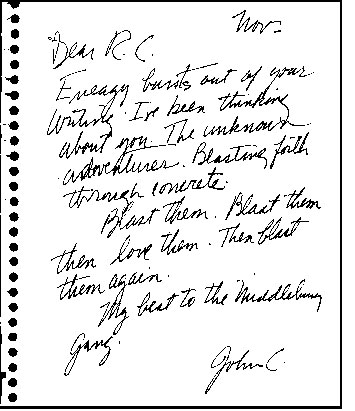
She has no idea that I lose ten or twenty or thirty thousand dollars every time I take on a project about her husband. That I lose that much money every year I continue to maintain this site. And that I do it again and again. Voluntarily. That I, in fact, CHOOSE to do it. In other words, that I am NOT in it for the money. That I am in it for ENTIRELY other reasons.
The thing I'm sure she just can't get her brain around is that I'm a scholar, that I'm in love with knowledge and art and communicating these things to others. I'm sure she has never met a REAL scholar--someone who is not in it for money or fame or glory or press coverage. She just can't understand that I am doing everything I do for other reasons. I don't think she waives her acting fees or pays thousands of dollars out of her own pocket to act when she believes in the value of a film project, so she probably can't even imagine doing something for free--or for a financial loss--this way. For love of the subject. To discover. To learn. To communicate the discoveries and learning to other people.
Of course, the irony is that this is the reason her husband made movies; but her treatment of me, her legal battles with me, show that she never understood him or his way of thinking either. So yes, you'll get no argument from me: Rowlands's behavior is, in my value system, very strange, very weird. It's actually insane from my perspective. (But so much of the world is insane in this way that her addition to it hardly matters.) Yes, it is demoralizing, it is crushing to have to deal with someone who has that way of thinking, that view of life. But I won't change. I can't change. All I can do and be is what I have done and what I still am.
But, boy, it is an education for me in how different Rowlands is from the roles she played in her husband's work, how different she is from her public image. But as I always say: Live and learn.
Thanks for your sympathetic comments and kind words.
--R.C.
Prof. Carney,
A question: In today's age, the spiritual world is so denied that I'm almost looked down upon whenever I mention that humans have a "soul." Why do you think that is? Is it from the saturation and influence of a secular pop culture, or do you think it originates from lazy human thinking?
Doing some research about independent film, I read most of the articles on your sight ("Dark Visions of..." being the current scratch for my frustrated-with-artists itch) and came across your letter encouraging research and now I realize just how busy and barraged with requests you are. I'd write you something expressing my appreciation, but I'm too honest and tired to come up with a good Hallmark card remark.
Thank you,
Reagan
P.S. Real quick: That male "reporter of inner hurricanes" writer I met recently let me and my professor read a short story of his. I thought there was a great true spiritual conflict throughout. My prof. saw all this sociological stuff, which I got, but I felt there was more there. I talked to the writer in the parking lot and...yep, he's as spiritually driven as I thought he was. These are the kind of people America needs right now. Thank God I met him before theories destroy him.
RC replies: I'd think there are at least two reasons for the looks you get. First, people are fashion 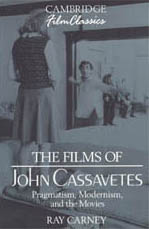 slaves and second, people put other people in boxes. The first point means that spiritual terms and concepts are not currently in fashion among intellectuals. So when they hear talk about a soul, you might as well be talking about ghosts or witches, as far as they are concerned. The second point means that, once you have talked this way, they put you in the same conceptual box they put right-wing, National Rifle Association, bible-thumping fundamentalists. They can't see you as an individual, only as a category. It's a problem with our brains. (Read Bare Bones Meditation by Joan Tollifson or Huang-Po on The Doctrine of No Mind or practically anything by Toni Packer or Steve Hagen for more than you want to know on this subject.) Thoughts, ideas, conceptions, categories prevent us from seeing and experiencing reality. They block our view. They hide experience. They simplify it and stop its flow. We only see the concepts. And that's how most people live. Trapped in an ideological or theoretical box of their own making. They can't deal with complexity, subtlety, individuality, flow, flux, blur. They turn experience into thoughts, reducing others to stereotypes and themselves to being mechanical followers of intellectual and emotional abstractions.
slaves and second, people put other people in boxes. The first point means that spiritual terms and concepts are not currently in fashion among intellectuals. So when they hear talk about a soul, you might as well be talking about ghosts or witches, as far as they are concerned. The second point means that, once you have talked this way, they put you in the same conceptual box they put right-wing, National Rifle Association, bible-thumping fundamentalists. They can't see you as an individual, only as a category. It's a problem with our brains. (Read Bare Bones Meditation by Joan Tollifson or Huang-Po on The Doctrine of No Mind or practically anything by Toni Packer or Steve Hagen for more than you want to know on this subject.) Thoughts, ideas, conceptions, categories prevent us from seeing and experiencing reality. They block our view. They hide experience. They simplify it and stop its flow. We only see the concepts. And that's how most people live. Trapped in an ideological or theoretical box of their own making. They can't deal with complexity, subtlety, individuality, flow, flux, blur. They turn experience into thoughts, reducing others to stereotypes and themselves to being mechanical followers of intellectual and emotional abstractions.
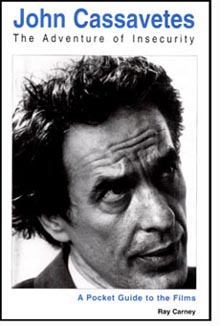 Our need to reduce others, to cut them to fit our categories, by turning experience into ideas in these sorts of ways is the source of a lot of the world's problems. In this sense, what your professor does to writing by turning it into sociology when he reads this person's writing is no different than what these people do to you by turning you into a crackpot when they hear the word "soul." Both are letting ideas prevent them from actually seeing, feeling, and experiencing the irreducible complexity, the richness, the wonder of experience. We must learn to think without ideas. I have more on this in my Cassavetes and Leigh books. On how to live without ideas and make art that eludes theories (especially the ideology, race, class, and gender theories that are so trendy nowadays). Theories kill life. Ideas are lies about experience. To live this way, to think without ideas, to surf the flux is what William James called pragmatism (but it seems nobody I know actually understands what that philosophy really means, or how radical it is). It's also at the center of Zen training.
Our need to reduce others, to cut them to fit our categories, by turning experience into ideas in these sorts of ways is the source of a lot of the world's problems. In this sense, what your professor does to writing by turning it into sociology when he reads this person's writing is no different than what these people do to you by turning you into a crackpot when they hear the word "soul." Both are letting ideas prevent them from actually seeing, feeling, and experiencing the irreducible complexity, the richness, the wonder of experience. We must learn to think without ideas. I have more on this in my Cassavetes and Leigh books. On how to live without ideas and make art that eludes theories (especially the ideology, race, class, and gender theories that are so trendy nowadays). Theories kill life. Ideas are lies about experience. To live this way, to think without ideas, to surf the flux is what William James called pragmatism (but it seems nobody I know actually understands what that philosophy really means, or how radical it is). It's also at the center of Zen training.
And you're right, of course, we do live in an anti-spiritual age (an age that reveres money and power and status and objects--the opposites of inwardness and spirit and soul), so that's part of it too.
All best wishes,
Ray Carney
Dear Professor Carney,
Encouraged by your advice to beat a path out of the jungle, I have moved out of my family's home and settled in New York ... for the time being. At first, it was tempting to settle for PA work and "use" my NYU degree. But luckily I found a home working at an independent bookstore. Day after day, I meet interesting, compassionate people that care about art and meaningful living. The store only plays classical music, so I get to hear Mozart and Bach all day long! Best of all, though, is that I have my mornings free to write and develop myself intellectually.
(personal material omitted)
Anyway, thank you for continuing to update your Mailbag regularly - it keeps me going.
Very sincerely,
(Name withheld)
RC replies:
Do something creative every day. And I mean don't just think it--do it! Write it, say it, act it, film it, perform it, do it. The doing is all. Even just keeping a journal or talking your ideas out with someone can make all the difference in the world. Convert your thoughts into actions and events.
Prof. Carney,
Doing some study on Tarkovsky this morning. I love this quote from Stalker I found (haven't been able to obtain a copy of that yet):
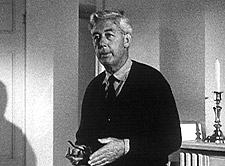
"Here we are at the threshold. This is the most important moment of your lives. You have to know that here your most cherished wish will come true. The most sincere one. The one reached through suffering."
Tarkovsky is so deep spiritually, I love his work. I can see I need to try to get a copy of Sculpting in Time. I'm obtaining as many of his films as I can to view when I've finished with Bresson. As T told his wife on his deathbed, it is time for a new direction. And as Tolstoy said, "...seek, always to seek..." A restless spirit, a student of life, never rests...
And so I go. I wish I had ten lifetimes to do nothing but read and learn...
M.
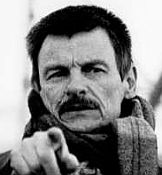 RC replies:Thank you for the deeply spiritual response. I am sharing it with the readers of my site. Tarkovsky (and you) are so right. There is only now, today, the present, this moment. There is nothing else. Everything else is the delusion of thought, desire, ideas, fears, dreams, wishes, dissatisfactions. That is why, even though we search constantly for ends and destinations, there is no destination and no end of searching, learning, studying, exploring, wondering, noticing, caring. Thanks to you and Tarkovsky and Stalker for reminding me of that. And, with respect to your final comment: One lifetime is enough, one lifetime is plenty, if we don't waste it. -- R.C.
RC replies:Thank you for the deeply spiritual response. I am sharing it with the readers of my site. Tarkovsky (and you) are so right. There is only now, today, the present, this moment. There is nothing else. Everything else is the delusion of thought, desire, ideas, fears, dreams, wishes, dissatisfactions. That is why, even though we search constantly for ends and destinations, there is no destination and no end of searching, learning, studying, exploring, wondering, noticing, caring. Thanks to you and Tarkovsky and Stalker for reminding me of that. And, with respect to your final comment: One lifetime is enough, one lifetime is plenty, if we don't waste it. -- R.C.
This
is only the "To Print" page. To go to the regular page of Ray Carney's www.Cassavetes.com on which this text appears, click
here, or close this window if you accessed the "To Print" page
from the regular page. Once you have brought up the regular page, you may use
the menus to reach all of the other pages on the site.
 A note from Ray Carney: This spring (2007) represents the tenth anniversary of one of the most important events in the history of civilization. Like most other supremely important events, its occurrence was not reported in any of the mass media (just as the upcoming anniversary will not be reported). It's hard to say precisely, but I would estimate that only three or four thousand people, at the very most, have any idea what I am talking about, and it may be decades before what took place in the spring of 1997 is more generally known,or its full implications understood -- perhaps never. But I felt I owed it to myself and a few knowledgeable acquaintances to commemorate the moment. Like any world-historical event, the ramifications are really in the hands of succeeding generations. Nothing is determined; nothing settled at this point. All is potential, possibility, opportunity. Only time will tell if the event I am alluding to (and this deliberately veiled and oblique mention of it) represents a birth announcement or an obituary notice. --R.C.
A note from Ray Carney: This spring (2007) represents the tenth anniversary of one of the most important events in the history of civilization. Like most other supremely important events, its occurrence was not reported in any of the mass media (just as the upcoming anniversary will not be reported). It's hard to say precisely, but I would estimate that only three or four thousand people, at the very most, have any idea what I am talking about, and it may be decades before what took place in the spring of 1997 is more generally known,or its full implications understood -- perhaps never. But I felt I owed it to myself and a few knowledgeable acquaintances to commemorate the moment. Like any world-historical event, the ramifications are really in the hands of succeeding generations. Nothing is determined; nothing settled at this point. All is potential, possibility, opportunity. Only time will tell if the event I am alluding to (and this deliberately veiled and oblique mention of it) represents a birth announcement or an obituary notice. --R.C.
 mistaken connections to the desire-created and thought-created illusions of achievement, attainment, success, money, power, and popularity. Question: What would an art that understood such things look like? Answer: Like the work of Alice Munro, of Henry James, of John Cassavetes, of Jean Renoir, of Andrei Tarkovsky, of Abbas Kiarostami, of Robert Bresson -- and the work of a lot of other great artists. Question: What would it not in the least look like? Answer: Like business-as-usual, like the news, like the newspaper, like television -- and certainly not like Hollywood or the work of Hitchcock, or Tarantino, or the Coen brothers. As Lawrence says, start with the sun, the stars, the cosmos; start with the earth and the rain and the clouds and the light and the air; start with your family, your friends, and others you love -- and the rest will slowly happen. --R.C.
mistaken connections to the desire-created and thought-created illusions of achievement, attainment, success, money, power, and popularity. Question: What would an art that understood such things look like? Answer: Like the work of Alice Munro, of Henry James, of John Cassavetes, of Jean Renoir, of Andrei Tarkovsky, of Abbas Kiarostami, of Robert Bresson -- and the work of a lot of other great artists. Question: What would it not in the least look like? Answer: Like business-as-usual, like the news, like the newspaper, like television -- and certainly not like Hollywood or the work of Hitchcock, or Tarantino, or the Coen brothers. As Lawrence says, start with the sun, the stars, the cosmos; start with the earth and the rain and the clouds and the light and the air; start with your family, your friends, and others you love -- and the rest will slowly happen. --R.C.  "What man most passionately wants is his living wholeness and his living unison, not his own isolate salvation of his "soul." Man wants his physical fulfillment first and foremost, since now, once and once only, he is in the flesh and potent. For man, the vast marvel is to be alive. For man, as for flower and beast and bird, the supreme triumph is to be most vividly, most perfectly alive. Whatever the unborn and the dead may know, they cannot know the beauty, the marvel of being alive in the flesh. The dead may look after the afterwards. But the magnificent here and now of life in the flesh is ours, and ours alone, and ours only for a time. We ought to dance with rapture that we should be alive in the flesh, and part of the living, incarnate cosmos. I am part of the sun as my eye is part of me. That I am part of the earth my feet know perfectly, and my blood is part of the sea. My soul knows that I am part of the human race, my soul is an organic part of the great human soul, as my spirit is part of my nation. In my own very self, I am part of my family. There is nothing of me that is alone and absolute except my mind, and we shall find that the mind has no existence by itself, it is only the glitter of the sun on the surface of the waters.
"What man most passionately wants is his living wholeness and his living unison, not his own isolate salvation of his "soul." Man wants his physical fulfillment first and foremost, since now, once and once only, he is in the flesh and potent. For man, the vast marvel is to be alive. For man, as for flower and beast and bird, the supreme triumph is to be most vividly, most perfectly alive. Whatever the unborn and the dead may know, they cannot know the beauty, the marvel of being alive in the flesh. The dead may look after the afterwards. But the magnificent here and now of life in the flesh is ours, and ours alone, and ours only for a time. We ought to dance with rapture that we should be alive in the flesh, and part of the living, incarnate cosmos. I am part of the sun as my eye is part of me. That I am part of the earth my feet know perfectly, and my blood is part of the sea. My soul knows that I am part of the human race, my soul is an organic part of the great human soul, as my spirit is part of my nation. In my own very self, I am part of my family. There is nothing of me that is alone and absolute except my mind, and we shall find that the mind has no existence by itself, it is only the glitter of the sun on the surface of the waters.




